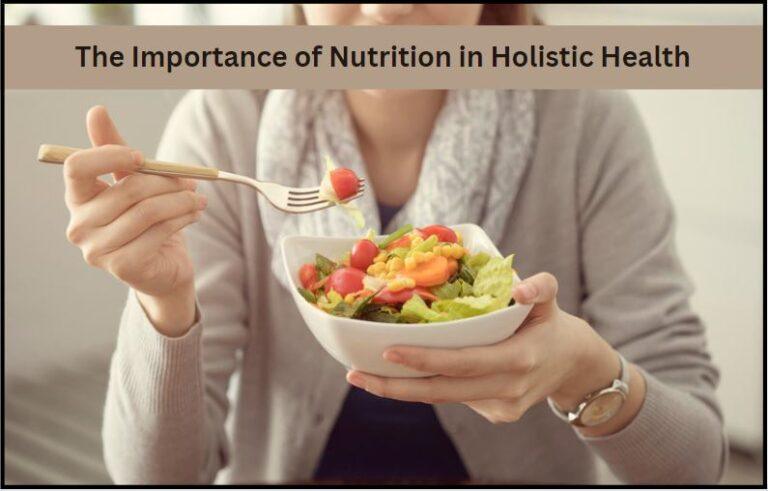10 Holistic Approaches To Weight Loss That Don’t Make You Count Calories
When I talk about weight loss, I often see raised eyebrows when the term ‘holistic’ comes up. It’s a word that somehow sounds both vague and specific, and understanding what it means in the context of weight management is crucial.
You’ve heard the typical advice: watch what you eat and exercise more. But the truth is, focusing solely on these factors can lead to frustration and unsatisfactory results.
I’m here to show you how taking holistic approaches to weight loss can be the game changer in your journey.
Holistic weight loss isn’t about counting every calorie or hitting the gym with military precision. It’s about viewing yourself as a complete person, considering every aspect of who you are and how you live.
It’s recognizing that your emotions, your mental state, your spiritual wellness, and your physical health are interconnected, each playing a vital role in your ability to manage weight effectively.
Now, you might be wondering why this comprehensive strategy is important or how all these elements tie into losing weight. Think about it this way: the way you cope with stress, the quality of your sleep, how you internalize emotions—they all have physical effects on your body. They can influence the choices you make about food, your ability to stay physically active, or even how your body metabolizes what you eat.
A holistic approach dares to look beyond the surface, venturing into areas often overlooked in traditional weight loss paradigms. It’s about integrating the physical with the non-physical, crafting a weight loss plan that’s as much about your inner wellbeing as it is about the outer results.
So, I invite you to continue on to the next section, where we’ll explore the four pillars of holistic health in greater depth and see exactly how they impact your weight loss efforts.

The Four Pillars of Holistic Health and Their Impact on Weight Loss
When I approach weight loss, I see it not just as a physical challenge, but as a journey that captures every part of what makes us human. The ‘four pillars of holistic health’ – emotional, spiritual, mental, and physical – are central to this journey. Each pillar plays a critical and interconnected role in our ability to manage weight.
Emotional Health and Weight Loss
Let’s talk about emotional health. It’s that intangible part of us that significantly influences our behaviors, habits, and overall well-being. You might be thinking, “But what does this have to do with weight loss?” Well, quite a lot, actually!
Our emotions can directly impact our eating habits. I know this one firsthand! Ever found yourself reaching for a tub of ice cream after a stressful day or munching on chips when you’re bored? That’s emotional eating, a common response to stress, anxiety, or even boredom. I suffered from emotional eating for the longest time.
- When we’re emotionally balanced, we’re better equipped to make mindful, healthy food choices and less likely to succumb to emotional eating.
- We’re more likely to listen to our body’s hunger and fullness cues rather than using food as an emotional band-aid.
- Plus, feeling good emotionally can motivate us to stay active and maintain a consistent exercise routine, a key component of sustainable weight loss.
Managing your emotional health isn’t just about the number on the scale, though. It’s about nurturing a positive relationship with food and your body. It’s about understanding that it’s okay to enjoy a slice of cake at a party or a comfort meal when you need it, without guilt or regret. It’s about viewing food as nourishment, not as an enemy or a source of comfort.
So, how do we manage our emotional health for weight loss? Here are a few strategies:
- Mindfulness: Practice being present in the moment, whether you’re eating a meal or taking a walk outdoors.
- Stress Management: Find healthy outlets for stress like yoga, meditation, or even a hobby you love.
- Emotional Expression: Don’t bottle up your feelings. Talk to someone you trust, write in a journal or consider professional help if needed. Cry if you feel like it. Get it out and allow yourself to express yourself fully knowing it’s ok to do so. 🙂
- Self-Care: Regularly take time to do something that makes you feel good, whether it’s reading a book, taking a bath, or listening to your favorite music.

Spiritual Health and Weight Loss
Spiritual health, although deeply personal and different for everyone, generally involves a sense of peace, purpose, and connection to others and the world around us. It’s about finding meaning in life experiences and having faith in something bigger than ourselves.
So, how does this tie into weight loss? Well, let’s unravel this together.
- When we are spiritually balanced, we are more in tune with our bodies and our emotions.
- We develop a deeper appreciation for our bodies not just as physical entities, but as vessels that carry us through this beautiful journey called life.
- This perspective can shift our attitude towards food and exercise from being punitive or restrictive to nurturing and celebratory.
- We start to view food as a source of nourishment and exercise as a form of self-care.
When I started to explore and experiment with the above, it changed my entire world!
Here are some strategies to nurture your spiritual health for weight loss:
- Mindful Meditation: Regularly practice mindfulness or meditation to stay present and grounded.
- Emotional Expression: Share your feelings with a trusted friend, family member, or mental health professional.
- Self-Care Rituals: Dedicate time each day to activities that bring you joy and relaxation.
- Positive Affirmations: Speak kindly to yourself and cultivate a positive mindset.
Mental Health and Weight Loss
Our mental health is like the unseen roots of a tree. While not always visible, it forms the foundation of our overall well-being, profoundly influencing our thoughts, behaviors, and the choices we make each day. And yes, that includes our decisions about food and exercise!
When our mental health is in equilibrium, we’re better equipped to make mindful, nutritious food choices, and we’re more likely to engage in regular physical activity. Why? Because when our minds are clear and focused, we can tune into what our bodies truly need to thrive, rather than being swayed by stress, anxiety, or other challenging emotions that might lead us to emotional eating or sedentary habits.
But let’s pause for a moment and remember: this journey isn’t just about the number on the scale.
- It’s about nurturing a healthy, positive relationship with food, our bodies, and ourselves.
- It’s about recognizing that food is not an enemy, but a source of nourishment. It’s about understanding that exercise is not a punishment, but a celebration of what our bodies can do.
Strategies to nurture the mind for weight loss:
- Regular Exercise: Engaging in physical activity every day can elevate your mood and improve your overall health. Even something as simple as a 30-minute walk can make a significant difference.
- Healthy Eating & Hydration: Consuming regular, nutritious meals and staying well-hydrated are essential for both physical and mental wellness.
- Quality Sleep: Sleep is as vital to our mental health as it is to our physical health2. Strive for good, quality sleep each night.
- Kindness: Practicing kindness, towards ourselves and others, can enhance our sense of wellbeing.
- Mindfulness: Being present in the moment can help us manage stress and anxiety. Consider mindfulness exercises or meditation.
- Self-Care Activities: Engage in hobbies and relaxation techniques that promote self-care. This could be anything from reading a book to taking a leisurely bath.
- Social Connections: Cultivate strong, positive relationships. They can provide support and enhance your sense of belonging.

Physical Health and Weight Loss
Physical health is like the beautiful, blooming flower of our wellbeing garden. It’s what we often think of first when we consider our health, and it plays an undeniable role in our weight loss journey.
When our physical health is flourishing, we are better equipped to embark on a successful weight loss journey. A strong, healthy body enables us to engage in regular physical activity and make mindful, nutritious food choices. But remember, this journey isn’t just about the number on the scale. It’s about celebrating our bodies, nurturing our health, and empowering ourselves to live our best lives.
But why is managing our physical health so important? Well, our bodies are the vessels that carry us through this incredible journey called life. When we take care of them, we’re not just investing in our longevity, but also our quality of life.
Our physical health really determines how we can live.
- Whether we can expend the energy to play with kids and/or grandkids
- How often we get or don’t get sick
- How strong our immune systems are
- How soon we get out of breath going up the stairs
- If you can walk up stairs or take the elevator
Here are some strategies to nurture your physical health:
- Regular Exercise: Engage in physical activity every day. It can be anything from a brisk walk to a yoga session or a dance class. Find something you enjoy, and make it a part of your routine.
- Balanced Nutrition: Nourish your body with a variety of nutrient-dense foods. Think colorful fruits and vegetables, lean proteins, whole grains, and healthy fats.
- Hydration: Stay well-hydrated by drinking plenty of water throughout the day.
- Restful Sleep: Aim for 7-9 hours of quality sleep each night. Our bodies use this time to repair, regenerate, and recharge.
- Regular Check-ups: Schedule regular check-ups with your healthcare provider to keep track of your overall health and catch any potential issues early.
So, as we journey towards wellness, let’s remember to nurture not just our minds and spirits, but also our bodies. After all, true health is about harmony between all these elements.
And remember, you’re not alone on this journey. I’m here, cheering you on, offering a helping hand when you need it, and celebrating your victories, big and small. Here’s to your health, in every sense of the word!
Stress and Sleep: The Underappreciated Factors in Weight Loss
Many people overlook the role that stress and sleep play in weight loss. The truth is, both are critical components that can either contribute to weight gain or support weight loss efforts.
Stress
For starters, consider the stress hormone cortisol. My body, like yours, produces cortisol when it’s under stress. This hormone isn’t a bad guy; it’s essential for survival. However, when cortisol levels are consistently high, as they can be during periods of chronic stress, it triggers the body to store fat, particularly around the midsection. So, if you want to lose that gut, it’s more about how well you are able to manage your stress levels than anything else.
Sleep
Likewise, sleep must not be taken lightly. I’ve learned that not getting enough quality sleep can sabotage my weight loss plans. Why? Because when you’re sleep-deprived, the body produces more ghrelin, the ‘hunger hormone,’ which can make you crave carbs and sugary foods. At the same time, production of leptin, the hormone that signals fullness, drops. This double-whammy increases the likelihood of overeating and weight gain.
Incorporating habits that promote good sleep and stress management can make a big difference. I find that when I aim for seven to nine hours of sleep and practice stress-reduction techniques such as meditation or deep breathing exercises, I’m in a better position to make healthier food choices and maintain a regular exercise routine.
It sets up a positive cycle where stress and sleep no longer hinder weight loss efforts, but rather support them.
Incorporating Joy and Balance in Your Weight Loss Journey
Your weight loss journey isn’t just about the numbers on the scale; it’s about crafting a life filled with moments that make you smile. If you’re wondering how joy and balance fit into weight loss, I’ve got some insights that might change the way you think about dieting and exercise.
- Finding joy in the process is vital. When you genuinely enjoy your activities, be it cooking a nutritious meal or dancing to your favorite song, you’re more likely to stick with these habits long-term. It’s about creating a positive association with the behaviors that lead to weight loss.
- Moreover, I believe in the power of balance. It’s unrealistic and unkind to expect yourself to be perfect 24/7. It’s okay to have a slice of birthday cake, to skip the gym for a day, or to have a lazy Sunday. This flexibility can actually prevent the all-or-nothing mentality that often derails weight loss efforts.
- Consider, for example, the act of dining out with friends. You can still make healthy choices without isolating yourself or forgoing the pleasures of a meal shared with loved ones. Balance in this context means enjoying the social aspect of eating while remaining conscious of your health goals.
To smoothly transition into our next discussion, remember that these moments of joy and balance aren’t standalone aspects; they’re an integral part of a holistic approach to weight loss. I’m about to share with you TEN TACTICS that can help infuse these principles into your everyday life, nudging you gently towards your weight goals in a sustainable and enjoyable way.
Top 10 Holistic Approaches to Weight Loss for a Healthier You
True, sustainable weight loss isn’t solely about the number on the scale; it’s about nurturing yourself wholly. From what I’ve learned, weaving holistic habits into your lifestyle can indeed transform your health journey. Here are ten strategies that encapsulate this comprehensive approach.
Mindful eating
Firstly, adopt a practice of mindful eating. Pay attention to the textures, flavors, and sensations of your food. This isn’t just about savoring your meal; it’s about being fully present, which can lead to better portion control and greater satisfaction with less food.
Quality Sleep
Ensuring you get enough quality sleep every night is non-negotiable. Sleep is when your body recovers, regulates hunger hormones, and even when muscle growth happens post-exercise. Create an evening routine that signals to your body it’s time to wind down and rest.
Physical Fitness
Find physical activities that bring you joy. Exercise shouldn’t feel like punishment; it should be something you look forward to. Whether it’s hiking, dancing, or yoga, a positive attitude towards movement prompts you to stay consistent.
Self Care
Set aside time for emotional self-care. This might mean journaling, therapy, or simply having heart-to-hearts with a friend. When your emotional needs are met, you’re less likely to turn to food for comfort.
Stress Management
Learn stress-relief techniques that work for you. It could be meditation, breathing exercises, or a hobby. Managing daily stress can help lower excess cortisol that may contribute to weight gain.
Social Network
Oftentimes, weight loss is fostered in social settings. A supportive network can provide motivation and accountability. Surround yourself with those who respect your goals and are willing to encourage you.
Reflection
Take moments to connect with your deeper purpose and goals. Why do you want to lose weight? Reflecting on this can reignite your motivation, especially on challenging days.
Show Yourself Grace
Approach your weight loss journey with flexibility. Rigid dieting can lead to feelings of deprivation and subsequent binging. Instead, honor your body’s signals and allow yourself treats in moderation.
Nutrition
Nutrition is key; aim to fill your plate with a variety of foods. Different colors and textures are not just visually pleasing; they ensure a broader intake of nutrients, which is critical for sustained energy and overall health.
Celebrate
And remember, celebrate every small win along the way. The scale might not always reflect your effort, but improvements in sleep, mood, and energy levels are significant strides towards a healthier you. These victories keep the fire alive and propel you forward.
Embarking on a Holistic Weight Loss Journey: Next Steps
You’ve armed yourself with the knowledge and tips for a holistic approach to weight loss. Now, it’s time to put this information into practice. As you move forward, remember that your journey is uniquely yours, and it’s about progress, not perfection.
Set realistic and achievable goals that respect your body and your life’s context. Break them down into smaller, incremental objectives that you can celebrate along the way. This not only boosts motivation but also builds confidence as you see tangible results from your efforts.
Don’t hesitate to reach out to professionals who understand the complexities of holistic health. Nutritionists, personal trainers, therapists, or life coaches can offer guidance that is tailored to your individual needs. They can assist you in navigating the challenges that inevitably arise on this journey.
Above all, make a personalized plan that suits you. What works for one person won’t necessarily be the right fit for another. Pay attention to how your body and mind respond to different foods, types of exercise, and stress-reduction techniques. Adjust accordingly, and be kind to yourself when things don’t go as planned.
Your motivation will ebb and flow, which is normal. To stay the course, seek support from friends, family, or a like-minded community. Sharing experiences, setting collective goals, or simply having someone to talk to can keep you on track.
Finally, take time regularly to reflect on your journey. Acknowledge the changes you’ve experienced, not just in weight, but in your emotional and mental state, your levels of stress and joy, and your overall health. Each step forward is a piece in the complex puzzle of your well-being.






